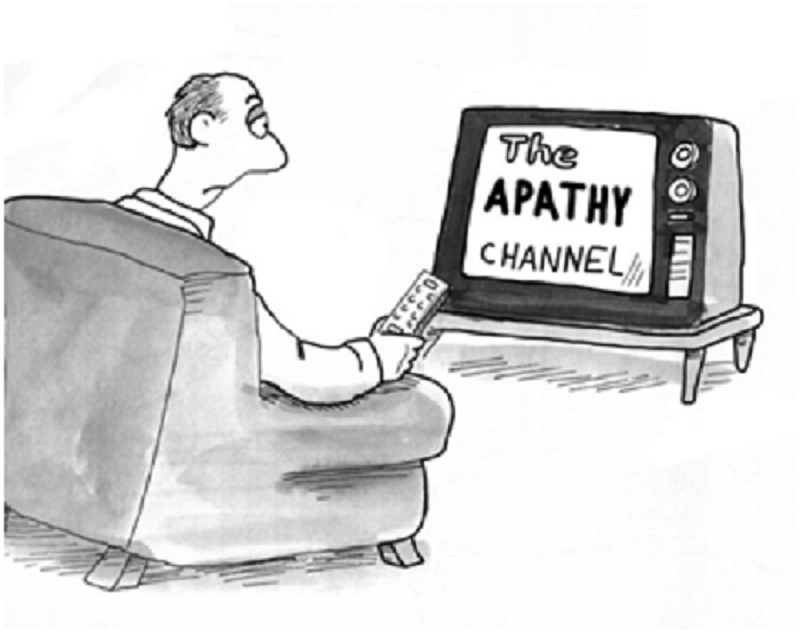
The Bizarre Power of American Apathy



It doesn’t happen all that often, but every now and again well-intentioned souls embrace me and apologize for America’s forgetfulness, all because I fought in Iraq like a zillion years ago. Presumably, this comes from their belief that GWOT types must be, at the very least, frustrated with their own national culture. After all, as the layman says, we duked-it-out with terrorists on behalf of our country… and if that same country shows itself to be culturally shallow and apathetic, shouldn’t we as its defenders take issue?Perhaps so but you don’t need to apologize to a vet for our social shortcomings. In fact, I’m going to make the argument that our self-absorption and forgetfulness as a society is perhaps one of our country’s greatest, albeit unintentional, tools for combatting terrorism.Bear with me here as I lay out my case. Take the war against ISIS, to name just one example. Remember them? Though leveled by the steadfast efforts of the DoD with Mattis at the helm, ISIS still wreaks some havoc and makes some headlines every so often. ISIS is more a footnote, though, at least for now,especially compared to our latest obsessions with sex scandals and presidential tweets.But let’s take it back to 2014 for a moment, back when these dudes running around in black pajamas were center stage.At the time, gruesome pictures and videos were emerging online of ISIS atrocities. These events, often scripted, were aimed directly at the West - James Foley, Steven Sotloff, the body of a headless girl, a woman whose blood was hurriedly filling a bowl as a group of men gleefully embraced their duties as Cutter or Holder-Down. Undoubtedly this footage shocked the world. It also helped recruit future jihadists in numbers, and with a level of zealous commitment rarely seen.ISIS harnessed the tools of the Information Age for more than just recruitment, however. As grandiose as it may sound, the medieval ideology behind ISIS is a desire to spur the chain of events bringing about Armageddon - the end of the world. With this strategic calculus, dragging the USA into another ground war seemed the best way to kick off this twisted brand of the apocalypse.But it didn’t exactly go that way, did it? Despite genuine outcry by many to bring ISIS to its knees, genuine pity for the slain, and disgust for what was witnessed on the screens of iPhones and gym televisions from Miami to Seattle, Americans demonstrated a remarkably high level of apathy, typical for such conflicts in remoter parts of the world.What occurred in 2014 and 2015 was nothing new, not even in our own lifetime. Slaughter, torture, and tapping into the depths of human cruelty have carried on through the decades in under-documented hotspots everywhere from the Balkans to Indonesia. ISIS simply latched onto the tools of modern media in order to attract greater attention. It was in our faces! It was supposed to galvanize us back into a sandy, bloody war! We were supposed to storm on over and encounter an enemy that hide among the local population, attack us as the insurgency did, bolster recruiting, and spark a perception of global jihad that would only grow and grow. But the irony is . . . on the aggregate, most of us here in the homeland didn’t really seem to lose too much sleep over it.The question then is, why?Pardon the nerdery, but I believe something called Singer’s proximity thesis touches on part of the answer. While a child drowning in a pond that is three feet away from you is just as serious as one drowning three thousand miles away, we overwhelmingly operate by prioritizing crises in an arrangement of proximal to distal (or near to far, for those of you with a combat MOS). And this makes total sense—you can only help the one three feet away, right? Well yes, but this natural arrangement, if no conscious effort is made to thwart it, often warps other mental categories that can, arguably, corrode moral decency. The urgency and severity of distant events can be neglected.To put it another way, the beheadings in Mosul were awful, but the rent was due and the car wouldn’t start—again. Give it some time: severe, distant events often become half-ignored messages scrolling at the bottom of our TV screens, especially when the demons of daily life are nibbling at our ankles.Proximity is one reason. But why ISIS’s shock tactics ultimately failed requires addressing two other things, both as American as apple pie and MOABs: materialism, and the entertainment industry. For creature comforts, I won’t waste your time cataloging the endless stream of new brands of trucks, shoes, and phones our culture constantly tumbles after. The latter element is worth looking more into.“Terrorism” is difficult to define but it’s important to overlay the existing definitions to observe what they have in common. Here are three I believe are pertinent:The unlawful use of violence and intimidation, especially against civilians, in the pursuit of political aims.The use of violence, especially murder and bombing, in order to achieve political goals or to force a government to do something.The systematic use of terror especially as a means of coercion.Persuasion is the rare constant among these. And even with the great weight of having marred the beginning of the 21st Century via the attacks on September 11th, consider this notion: gruesome acts by ISIS were broadcasted galore, yet still fell short of permanently mortifying us or sucking us back into conventional ground combat.Generally speaking—we got over the shock of such images rather quickly.It’s worth mentioning that in industries ranging from porn to video games a fascination with violence is at least one reason why it’s consumed in the first place, especially at such high levels (just ask Dave Grossman). Combine this “consumer desensitization” with the proximal-to-distal arrangement theory outlined above and you get the following result: citizens who, by and large, are as emotionally attached to a distant tragedy for only as long as the news clips are running.Call it a species of apathy. Call it a species of perseverance. Call it “you will not give us nightmares as long as we have our Starbucks lattes and flat-screen TVs.” Perhaps it’s a combination of all three, but one thing is for sure, for all the criticism surrounding our ways, the strategic value of “terrorism”, essentially psych ops, appears to have been deflected.
Written By David Rose (AKA Mr. Blonde)
October 4, 2018









